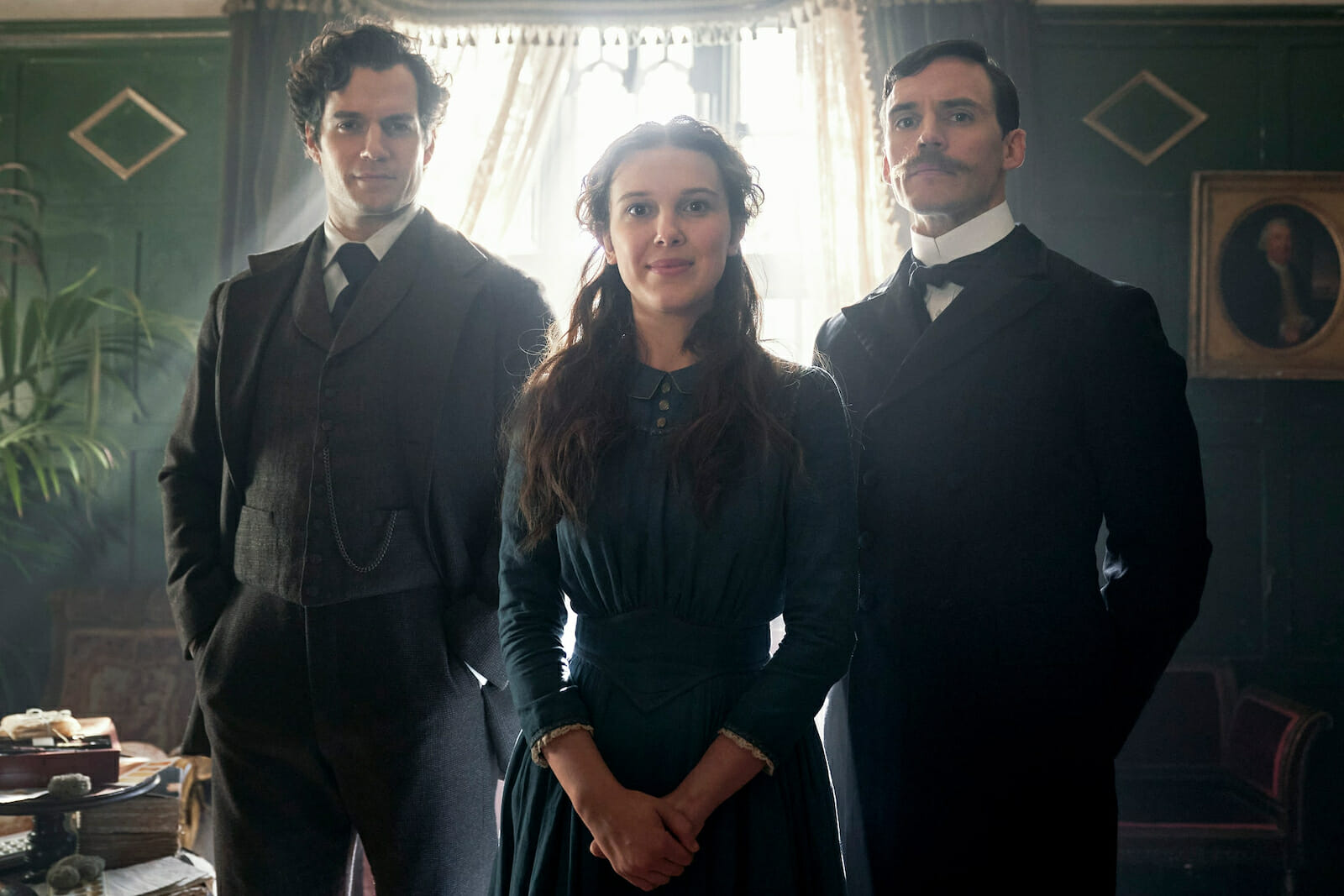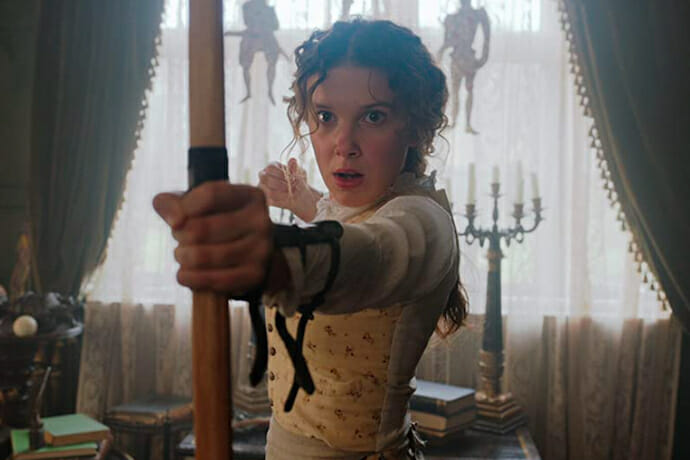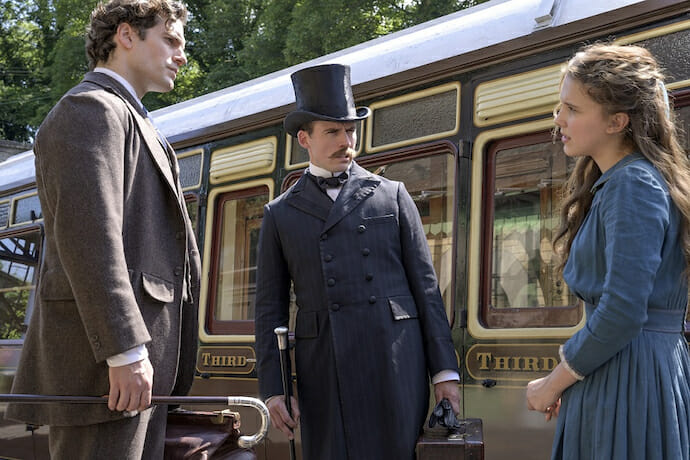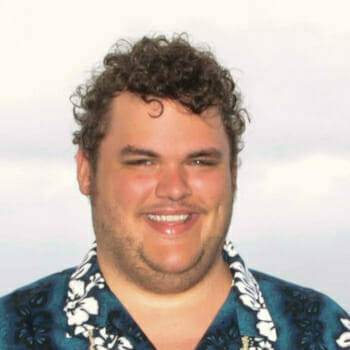
‘Enola Holmes’ is the High-Concept, Live-Action Kids Movie We’ve Been Missing
From the beginning of Netflix’s new movie Enola Holmes, starring Stranger Things’ Millie Bobby Brown as the titular character, she speaks to the audience as if sharing a secret. The first scene is her looking into the camera and asking “Now, where to begin?” while riding a bicycle. She muses about the details of her life, because she is, in fact, the little sister of Sherlock Holmes (Henry Cavill). And like her famous brother, she’s about to have an incredible adventure of her own. But unlike Sherlock, who is usually portrayed as stoic, analytical, and reserved, Enola wants to include the audience in on the fun. And that, I believe, is part of the secret to its success.
Enola is on a quest to find her mother (Helena Bonham Carter), who has disappeared. She enlists the aid of her brothers, Sherlock and Mycroft (Sam Claflin), to help – but Mycroft would prefer she go to finishing school. She goes off on her own – and encounters a young aristocrat (Louis Partridge) who is also escaping his overbearing family. When Enola arrives in Victorian London, the mystery deepens and she must fend for herself in an increasingly dangerous environment. Yet, Brown’s Enola stays spunky and optimistic, with a smirk that Brown hardly gets to utilize in her role as Eleven on Stranger Things.
From the minute I watched its trailer, I figured that Enola Holmes was likely going to end up being something special. And it’s true: I liked Enola Holmes a lot, it was a delightful distraction and a fun adventure. Brown carries the lead very charismatically, holding her own against a broad range of British character actors (trust me, you’ve seen a lot of them before, particularly in the Harry Potter movies), seasoned veterans like Carter and established blockbuster superstars like Cavill. But I also reveled in the type of movie it was indicative of: the high-concept, live-action kids movie. These are movies that usually star children and feature them as the main characters, full of their own agency and determination in the midst of a big adventure.
And sure, let’s address the elephant in the room: isn’t that what Harry Potter is? My answer is kinda. Maybe? Sort of? Harry Potter is practically in a genre of its own, a once-in-a-generation cultural touchstone whose popularity surpasses most other comparable books, films, and franchises. The early Harry Potter films could be reasonably claimed as those high-concept, live-action kids movies, albeit way more popular than other entries in the genre. But as the series continued, it got more mature and grew with its lead characters. By the middle entries, Harry Potter feels much more “young adult” as Harry, Ron, and Hermione deal with puberty, teenage angst, and drama, as well as an increasing threat of darkness and evil from Death Eaters and Voldemort.

But I think of the movies that came out pre-Potter when watching Enola Holmes. Because the Harry Potter film series was so incredibly revolutionary, it changed the status quo about what expectations were for the genre as a whole. The pre-Potter kids movies, much like Enola Holmes, did not usually feature “chosen one” characters or characters who had magic or supernatural abilities (with apologies to both Matilda and Alex Mack). Rather, they were kids thrown into challenging, unusual situations, figuring out how best to fix them. These movies tended to have more in common with a movie like The Goonies than they do with Potter. We had kids making their way through the Alaskan frontier (Alaska); we had kids learning to fly ultralight aircraft in order to get geese to migrate (Fly Away Home); we had kids with infinite money (Blank Check); we had the fictional president’s fictional son hanging with Sinbad as a secret service agent (First Kid); we had kids hanging out with Shaq as a genie (Kazaam); we had the kid from Jurassic Park getting a metal suit from space (Star Kid); we had a kid traveling back to King Arthur’s Court (A Kid in King Arthur’s Court); we had a kid learning there was an Indian in his cupboard (The Indian in the Cupboard); and, of course, we had a kid basically doing “Die Hard, but for kids” to stop burglars during Christmas (Home Alone). Long-standing literary and cultural staples like Madeline, Dennis the Menace, The Babysitters Club, and The Little Rascals got updated with big-screen adaptations for a new generation.
Pre-Potter, many of these high-concept movies thrived. But after the success of Potter and also the Lord of the Rings, Hollywood began abandoning these types of movies and doubling down on the proven formulas, pivoting from high concept, family-friendly movies to more big-budget, young-adult franchises like Twilight and The Hunger Games. Another influence was Disney, which stopped taking so many risks, particularly when it came to live-action content, and mostly doubled down on animated musicals, live-action remakes of animated musicals, and the consistently money-making franchises like Marvel, Star Wars, and the Pirates of the Caribbean.

Just the concept of “Sherlock Holmes’ younger sister solves mysteries in Victorian England” sounds much more in line with those 90s live-action kids movies than it does most kid-friendly genre movies made in the 21st century thus far. But Enola Holmes feels more like two movies from that pre-Potter era of kids movies in particular, and which happen to be two of my personal favorites: 1996’s Harriet the Spy, starring Michelle Trachtenberg, and 1998’s remake of The Parent Trap, starring Lindsay Lohan. Beyond all having female protagonists, both films share much more in common with Enola Holmes. Like Enola, Trachtenberg’s Harriet is a keen observer of people, and studies them in secret before her written reports on the people she “spied” on gets leaked to the school bully. Harriet is eccentric and quirky, raised less by her parents and more by a doting nanny named Golly, not only played by Rosie O’Donnell in what is probably her best role, but also in a role that resembles Carter in Enola Holmes. Golly and Carter’s Eudoria Holmes both encourage and educate their respective wards before leaving them to their own devices.
Like Hallie and Annie, the two twins that Lohan plays in The Parent Trap, Enola is headstrong. The central conceit of The Parent Trap is that the two twins, unaware of the other one’s existence, meet at summer camp and then decide to switch places. This allows Hallie to meet the mother (the late Natasha Richardson, glamourous and elegant as ever) she never knew, and Annie to meet to the father (Dennis Quaid, whose performance is still in the running for my favorite movie-dad of all time) she never knew. Similarly, Enola frequently disguises herself to fit the situation, whether dressing as a boy while riding a train, a Victorian lady while in London, or a widow while visiting a country estate. Both movies also have at their core a belief that the kids can manage for themselves, and might even know what’s going on and how to fix it better than the grown-ups do. The threat of untrustworthy family members sending them off to boarding school hangs over the main characters, and major chunks of both movies even happen to take place in London, albeit about a century apart.
I wish I had a TARDIS or a time-traveling DeLorean to go back in time and give my younger self a VHS copy of Enola Holmes. I imagine the younger me would be enthralled, cheering Enola on in her adventures, much like his 29-year-old counterpart did while watching it. I also imagine that past-me wouldn’t be able to distinguish that it was a movie made 20 years in the future (what CGI is present in Enola Holmes is hardly excessive), as it would seemingly fit alongside the other movies I mentioned. Rather than merely seeking to remake or reboot whatever was popular in decades past, I much prefer projects like Enola Holmes that are invocative of the type of films that were popular in decades past while not blatantly ripping them off. Instead, projects like these take inspiration in setting a new course and trying to be their own unique thing. I hope that Enola Holmes is ultimately successful, and that it encourages other producers and filmmakers to bring back some of that kids movie magic that has been lost in due time.

